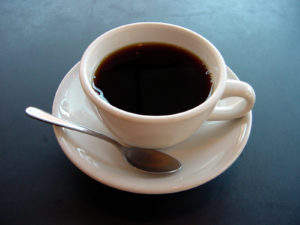 Many of us absolutely desire and need a caffeine containing beverage such as coffee or tea in the morning, and find it difficult to function without it. So, findings from a recent study shouldn't surprise us: morning coffee or other caffeinated drink boosts a person's mood .
Many of us absolutely desire and need a caffeine containing beverage such as coffee or tea in the morning, and find it difficult to function without it. So, findings from a recent study shouldn't surprise us: morning coffee or other caffeinated drink boosts a person's mood .
Also not surprising: the improved mood was strongest in the first 2 1/2 hours after awakening. They also confirmed that a person can have caffeine withdrawal symptoms, which go away after drinking caffeinated beverages such as coffee or tea.
Duh...of course. Every person that drinks coffee or tea in the morning knows this. But at least a study has now confirmed this.
From Medical Xpress: Morning coffee boosts mood significantly, study finds
People who regularly consume caffeine are usually in a better mood after a cup of coffee or another caffeinated drink—an effect that is much more pronounced in the morning than later in the day. This finding comes from a new study by researchers at Bielefeld University and the University of Warwick, published in the journal Scientific Reports. Participants reported feeling significantly happier and more enthusiastic on those mornings compared with other days at the same hour when they had not yet had coffee.
Links to negative moods such as sadness and feeling upset were also observed, though these effects were less pronounced: after drinking coffee, participants felt slightly less sad or upset than on comparable days without coffee. Unlike the boost in positive emotions, this effect was not dependent on the time of day.
In total, 236 young adults in Germany were studied over a period of up to four weeks. Participants completed short questionnaires on their smartphones seven times a day, indicating their current mood and whether they had consumed a caffeinated drink in the preceding 90 minutes. Accordingly, the study focused on caffeine consumption in everyday life, not just in artificial laboratory settings.
The researchers also investigated whether coffee has different effects on different individuals. Justin Hachenberger from Bielefeld University in Germany says, "We were somewhat surprised to find no differences between individuals with varying levels of caffeine consumption or differing degrees of depressive symptoms, anxiety, or sleep problems. The links between caffeine intake and positive or negative emotions were fairly consistent across all groups."
The researchers expected that people with higher levels of anxiety would experience negative mood changes, such as increased nervousness, after consuming caffeine. However, Hachenberger emphasizes that people who react to caffeine in a bad way may avoid it and that the study did not include people who completely abstain from caffeine.
The researchers explain the mood-boosting effect of caffeine on morning mood with its ability to block adenosine receptors, which promotes wakefulness and makes people feel more energetic. "Caffeine works by blocking adenosine receptors, which can increase dopamine activity in key brain regions—an effect that studies have linked to improved mood and greater alertness," says Professor Anu Realo from the University of Warwick.
Yet, it remains unclear whether these effects are related to a reduction in withdrawal symptoms after a night's sleep. "Even people with moderate caffeine consumption can experience mild withdrawal symptoms that disappear with the first cup of coffee or tea in the morning," says Realo.
"Around 80% of adults worldwide consume caffeinated beverages, and the use of such stimulating substances dates far back in human history," says Professor Sakari Lemola from Bielefeld University, the study's senior author. "Even wild animals consume caffeine; bees and bumblebees prefer nectar from plants that contain caffeine."
